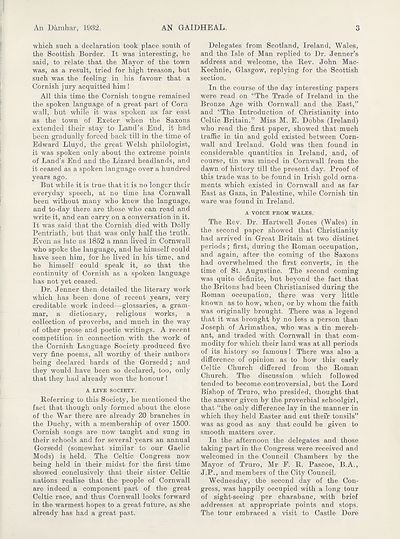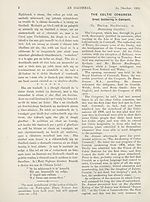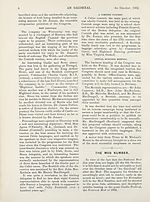Download files
Complete book:
Individual page:
Thumbnail gallery: Grid view | List view

An Damhar, 1932.
AN G-AIDHEAL.
3
which such a declaration took place south of
the Scottish Border. It was interesting, he
said, to relate that the Mayor of the town
was, as a result, tried for high treason, but
such was the feeling in his favour that a
Cornish jury acquitted him !
All this time the Cornish tongue remained
the spoken language of a great part of Corn
wall, but while it was spoken as far east
as the town of Exeter when the Saxons
extended their stay to Land’s End, it had
been gradually forced back till in the time of
Edward Lluyd, the great Welsh philologist,
it was spoken only about the extreme points
of Land’s End and the Lizard headlands, and
it ceased as a spoken language over a hundred
years ago.
But while it is true that it is no longer their
everyday speech, at no time has Cornwall
been without many who knew the language,
and to-day there are those who can read and
write it, and can carry on a conversation in it.
It was said that the Cornish died with Dolly
Pentriath, but that was only half the truth.
Even as late as 1852 a man lived in Cornwall
who spoke the language, and he himself could
have seen him, for he lived in his time, and
he himself could speak it, so that the
continuity of Cornish as a spoken language
has not yet ceased.
Dr. Jenner then detailed the literary work
which has been done of recent years, very
creditable work indeed—glossaries, a gram¬
mar, a dictionary, religious works, a
collection of proverbs, and much in the way
of other prose and poetic writings. A recent
competition in connection with the work of
the Cornish Language Society produced five
very fine poems, all worthy of their authors
being declared bards of the Gorsedd; and
they would have been so declared, too, only
that they had already won the honour!
A LIVE SOCIETY.
Beferring to this Society, he mentioned the
fact that though only formed about the close
of the War there are already 20 branches in
the Duchy, with a membership of over 1500.
Cornish songs are now taught and sung in
their schools and for several years an annual
Gorsedd (somewhat similar to our Gaelic
Mods) is held. The Celtic Congress now
being held in their midst for the first time
showed conclusively that their sister Celtic
nations realise that the people of Cornwall
are indeed a component part of the great
Celtic race, and thus Cornwall looks forward
in the warmest hopes to a great future, as she
already has had a great past.
Delegates from Scotland, Ireland, Wales,
and the Isle of Man replied to Dr. Jenner’s
address and welcome, the Rev. John Mac-
Kechnie, Glasgow, replying for the Scottish
section.
In the course of the day interesting papers
were read on “The Trade of Ireland in the
Bronze Age with Cornwall and the East,”
and “The Introduction of Christianity into
Celtic Britain.” Miss M. E. Dobbs (Ireland)
who read the first paper, showed that much
traffic in tin and gold existed between Corn¬
wall and Ireland. Gold was then found in
considerable quantities in Ireland, and, of
course, tin was mined in Cornwall from the
dawn of history till the present day. Proof of
this trade was to be found in Irish gold orna¬
ments which existed in Cornwall and as far
East as Gaza, in Palestine, while Cornish tin
ware was found in Ireland.
A VOICE FKOM WALES.
The Rev. Dr. Hartwell Jones (Wales) in
the second paper showed that Christianity
had arrived in Great Britain at two distinct
periods ; first, during the Roman occupation,
and again, after the coming of the Saxons
had overwhelmed the first converts, in the
time of St. Augustine. The second coming
was quite definite, but beyond the fact that
the Britons had been Christianised during the
Roman occupation, there was very little
known as to how, when, or by whom the faith
was originally brought. There was a legend
that it was brought by no less a person than
Joseph of Arimathea, who was a tin merch¬
ant, and traded with Cornwall in that com¬
modity for which their land was at all periods
of its history so famous ! There was also a
difference of opinion as to how this early
Celtic Church differed from the Roman
Church. The discussion which followed
tended to become controversial, but the Lord
Bishop of Truro, who presided, thought that
the answer given by the proverbial schoolgirl,
that “the only difference lay in the manner in
which they held Easter and cut their tonsils”
was as good as any that could be given to
smooth matters over.
In the afternoon the delegates and those
taking part in the Congress were received and
welcomed in the Council Chambers by the
Mayor of Truro, Mr F. R. Pascoe, B.A.,
J.P., and members of the City Council.
Wednesday, the second day of the Con¬
gress, was happily occupied with a long tour
of sight-seeing per charabanc, with brief
addresses at appropriate points and stops.
The tour embraced a visit to Castle Dore
AN G-AIDHEAL.
3
which such a declaration took place south of
the Scottish Border. It was interesting, he
said, to relate that the Mayor of the town
was, as a result, tried for high treason, but
such was the feeling in his favour that a
Cornish jury acquitted him !
All this time the Cornish tongue remained
the spoken language of a great part of Corn
wall, but while it was spoken as far east
as the town of Exeter when the Saxons
extended their stay to Land’s End, it had
been gradually forced back till in the time of
Edward Lluyd, the great Welsh philologist,
it was spoken only about the extreme points
of Land’s End and the Lizard headlands, and
it ceased as a spoken language over a hundred
years ago.
But while it is true that it is no longer their
everyday speech, at no time has Cornwall
been without many who knew the language,
and to-day there are those who can read and
write it, and can carry on a conversation in it.
It was said that the Cornish died with Dolly
Pentriath, but that was only half the truth.
Even as late as 1852 a man lived in Cornwall
who spoke the language, and he himself could
have seen him, for he lived in his time, and
he himself could speak it, so that the
continuity of Cornish as a spoken language
has not yet ceased.
Dr. Jenner then detailed the literary work
which has been done of recent years, very
creditable work indeed—glossaries, a gram¬
mar, a dictionary, religious works, a
collection of proverbs, and much in the way
of other prose and poetic writings. A recent
competition in connection with the work of
the Cornish Language Society produced five
very fine poems, all worthy of their authors
being declared bards of the Gorsedd; and
they would have been so declared, too, only
that they had already won the honour!
A LIVE SOCIETY.
Beferring to this Society, he mentioned the
fact that though only formed about the close
of the War there are already 20 branches in
the Duchy, with a membership of over 1500.
Cornish songs are now taught and sung in
their schools and for several years an annual
Gorsedd (somewhat similar to our Gaelic
Mods) is held. The Celtic Congress now
being held in their midst for the first time
showed conclusively that their sister Celtic
nations realise that the people of Cornwall
are indeed a component part of the great
Celtic race, and thus Cornwall looks forward
in the warmest hopes to a great future, as she
already has had a great past.
Delegates from Scotland, Ireland, Wales,
and the Isle of Man replied to Dr. Jenner’s
address and welcome, the Rev. John Mac-
Kechnie, Glasgow, replying for the Scottish
section.
In the course of the day interesting papers
were read on “The Trade of Ireland in the
Bronze Age with Cornwall and the East,”
and “The Introduction of Christianity into
Celtic Britain.” Miss M. E. Dobbs (Ireland)
who read the first paper, showed that much
traffic in tin and gold existed between Corn¬
wall and Ireland. Gold was then found in
considerable quantities in Ireland, and, of
course, tin was mined in Cornwall from the
dawn of history till the present day. Proof of
this trade was to be found in Irish gold orna¬
ments which existed in Cornwall and as far
East as Gaza, in Palestine, while Cornish tin
ware was found in Ireland.
A VOICE FKOM WALES.
The Rev. Dr. Hartwell Jones (Wales) in
the second paper showed that Christianity
had arrived in Great Britain at two distinct
periods ; first, during the Roman occupation,
and again, after the coming of the Saxons
had overwhelmed the first converts, in the
time of St. Augustine. The second coming
was quite definite, but beyond the fact that
the Britons had been Christianised during the
Roman occupation, there was very little
known as to how, when, or by whom the faith
was originally brought. There was a legend
that it was brought by no less a person than
Joseph of Arimathea, who was a tin merch¬
ant, and traded with Cornwall in that com¬
modity for which their land was at all periods
of its history so famous ! There was also a
difference of opinion as to how this early
Celtic Church differed from the Roman
Church. The discussion which followed
tended to become controversial, but the Lord
Bishop of Truro, who presided, thought that
the answer given by the proverbial schoolgirl,
that “the only difference lay in the manner in
which they held Easter and cut their tonsils”
was as good as any that could be given to
smooth matters over.
In the afternoon the delegates and those
taking part in the Congress were received and
welcomed in the Council Chambers by the
Mayor of Truro, Mr F. R. Pascoe, B.A.,
J.P., and members of the City Council.
Wednesday, the second day of the Con¬
gress, was happily occupied with a long tour
of sight-seeing per charabanc, with brief
addresses at appropriate points and stops.
The tour embraced a visit to Castle Dore
Set display mode to:
![]() Universal Viewer |
Universal Viewer | ![]() Mirador |
Large image | Transcription
Mirador |
Large image | Transcription
| An Comunn Gàidhealach > An Comunn Gàidhealach Publications > Gaidheal > Volume 28, October 1932--September 1933 > (11) Page 3 |
|---|
| Permanent URL | https://digital.nls.uk/127131144 |
|---|
| Description | This contains items published by An Comunn, which are not specifically Mòd-related. It includes journals, annual reports and corporate documents, policy statements, educational resources and published plays and literature. It is arranged alphabetically by title. |
|---|
| Description | A collection of over 400 items published by An Comunn Gàidhealach, the organisation which promotes Gaelic language and culture and organises the Royal National Mòd. Dating from 1891 up to the present day, the collection includes journals and newspapers, annual reports, educational materials, national Mòd programmes, published Mòd literature and music. |
|---|---|
| Additional NLS resources: |
|

